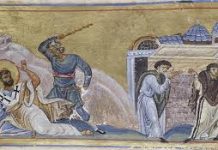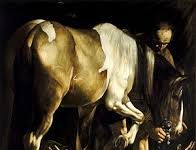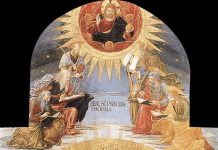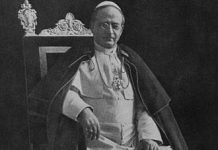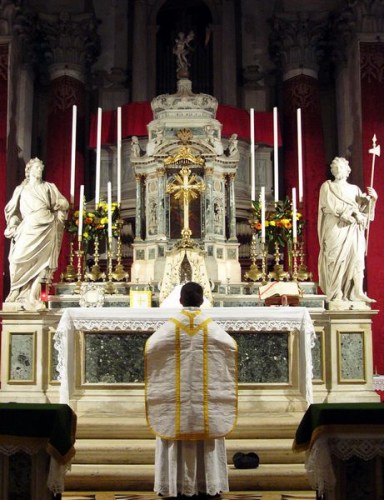
But you are a chosen race, a royal priesthood, a holy nation, God’s own people; in order that you may proclaim the mighty acts of Him who called you out of darkness into his marvellous light (1 Pt. 2:9).
As we continue our celebration of Easter and reflect on the earliest days of the Church, we recognise that the events that we recall were formative for the life of the Church, and their influence continues to be felt in our days. The seven men chosen and ordained to help in the work of the Church are the first of the Order of Deacons, sacred ministers whose ministry it is to assist both bishops and priests in their sacred duties and to serve the people of God, especially those who may be marginalized. The title deacon comes from the Greek word diakonos, which means servant. Deacons serve as a public sacramental sign of Christ in, and at the service of the world, although all Christians called to diakonia or service. This is what St. Peter surely affirms in our second reading from his first epistle: But you are a chosen race, a royal priesthood, a holy nation, God’s own people, in order that you may proclaim the mighty acts of him who called you out of darkness into his marvellous light (1 Pet. 2:9).
Over time, the Church has meditated and reflected on these words and their import, just as we are doing; and the fruit of this reflection is seen in the development of doctrine, that is, a deepening of our understanding of these realities. This fuller understanding is always manifested in the holiness of God’s people; a people defined by faithfulness, devotion and charity. Holiness is best understood as the perfection of charity, of sacrificial love; and this is our common vocation. This spirit of loving sacrifice defines the life of our parish. The inspiration for this sacrificial love is the Holy Sacrifice of the Mass; specifically the Offertory of the Mass which in a sense, may be considered the most important part of the Mass for us, since this is where we offer ourselves and our sufferings to God, in union with the offering and sufferings of Christ Our Lord. The Offertory Prayers are prayed silently by the priest, and this is a wise directive since it gives you an opportunity to unite your own personal prayer and offering to the Sacrifice about to be offered. We should attempt to live the Offertory not only by offering our sufferings to God in a spirit of reparation, but also to offer our Heavenly Father our sacrificial offerings in kind – our time, treasure and talent. As our faith matures and deepens we come to understand that the offerings we make are more than material or physical; indeed they are metaphysical and even mystical. This is how our life of work and prayer becomes a unified whole; and like the Sacrifice offered by Jesus the High Priest, the offering of ourselves becomes as exercise of our baptismal priesthood.
St. Peter Chrysologus, a fifth century Church Father exhorted his flock with these words: Each of us is called to be both a sacrifice to God and his priest. Do not forfeit what divine authority confers on you. Put on the garment of holiness….Keep burning continually the sweet-smelling incense of prayer…let your heart be an altar. Then with full confidence in God, present your body for sacrifice. God desires not death, but faith; God thirsts not for blood, but for self-surrender; God is appeased not by slaughter, but by the offering of your free will (Liturgy of the Hours, Vol. II, p. 772). In the offering of our very selves to God, nothing is imposed on us. Each one of us offers a free will offering. The examples of Our Lord, of Our Lady and the Saints however, inspire us to be generous with our faith, our self-surrender and our free will. It may be said that the effect of our offering is commensurate with the faith, love and generosity of our sacrifice. Our Lord assures us that the one who believes in me will also do the works that I do and, in fact, will do greater works than these (Jn. 14:12). To believe these words is to take on bold and daring works for the establishment of God’s Kingdom.
The Holy Sacrifice of the Mass re-presents Our Lord’s greatest work; and to this work of God (opus Dei) we join our own works in the exercise of our priestly office. St. John Vianney, the Patron Saint of Priests said that the priesthood is the love of the Sacred Heart of Jesus; which means that the priest is both an expression of Our Lord’s love and the means by which this love is made present. This is most certainly true of the ministerial priesthood; but it is also true of our baptismal priesthood, called as we all are by virtue of our baptism to be a holy priesthood, to offer spiritual sacrifices acceptable to God through Jesus Christ (1 Pet. 2:5). The charity of the Church and of the Church’s children is directed ultimately to the extension of the reign of Our Lord’s Most Sacred Heart in the social Kingship of Christ, and for the salvation of souls.
Let us be ever mindful of our priestly dignity and function. At every Mass, at the Offertory we are engaged in a mystically profound offering of our very selves as a living sacrifice. As we begin the month dedicated to Our Lady, the handmaid of the Lord whose fidelity is most exemplified at the foot of the Cross, may we imitate her example of generous devotion; for in Christ her Son, [we] are a chosen race, a royal priesthood, a holy nation, God’s own people; in order that [we] may proclaim the mighty acts of Him who called [us] out of darkness into his marvellous light (1 Pt. 2:9).

